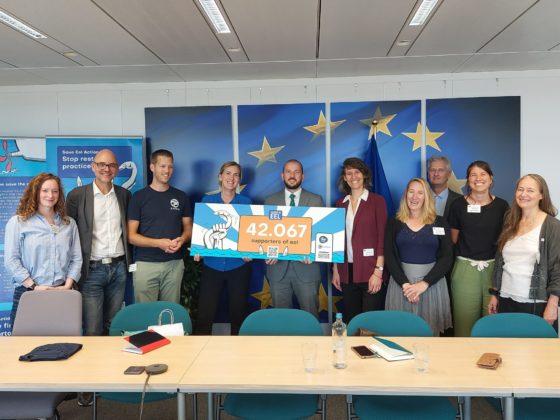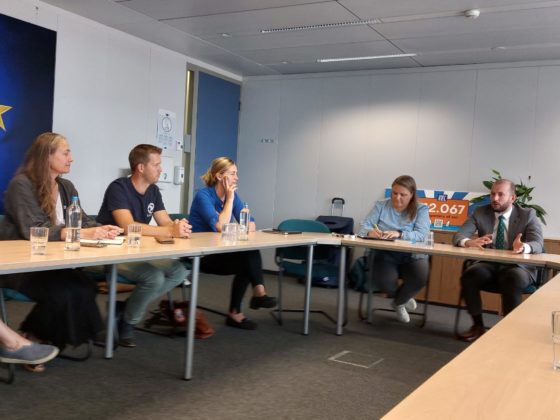
Stockholm 7 September 2022; Today, a group of NGOs from the informal Eel Alliance is meeting with Commissioner Sinkevičius to hand over the Power to the Eel petition – a call for action to protect the critically endangered European eel. With over 40,000 signatures from across the EU, it shows that there is widespread public support for stronger measures to aid its recovery.
Despite the EU recovery plan adopted in 2007, a recent scientific evaluation shows that the current measures are not working, and are not being implemented quickly enough. With only 1-5% of the estimated original population size, eel is still being targeted by both commercial and recreational fishing in most EU Member States. Only Ireland and Slovenia have closed all fishing, with some other countries banning either commercial or recreational catches.
This future of this enigmatic species is largely in the hands of the European Commission and the EU Member States. Together, they must urgently agree on stronger measures to turn the situation around. In the autumn of 2020, Good Fish and RAVON in the Netherlands launched their campaign Power to the Eel. The petition calls on the European Commission, the European Parliament and the EU Ministers to take further action to protect the endangered European eel.
– We need further action as a matter of urgency, and the responses to our campaign and petition from people across the EU and beyond shows that there is public support, both in the Netherlands and abroad, says Margreet van Vilsteren, Director at GoodFish.
– Europe today has very few waters which are unobstructed, unpolluted and where no fishing occurs. Eel needs a break from these three major anthropogenic pressures to begin recovering, says Martijn Schiphouwer, Team Leader for Fish at RAVON.
Since the launch of the petition, the scientific advice for eel fishing has changed to zero catch for all life stages in all habitats.
– We welcome the very clear signal from the scientific experts stating that a zero catch should apply to all fishing in all habitats, including juvenile eels used for restocking and aquaculture, says Niki Sporrong, European eel project manager at FishSec. However, closing the fisheries is not sufficient since the European Commission can only propose legislation for EU marine waters. Therefore, all the EU Member States have a crucial role to play by urgently taking action also in inland waters, addressing habitat loss and pollution. Saving the eel truly requires an EU wide effort.

After the publication of the scientific advice on fishing opportunities in November last year, the Commission launched a consultation, asking the EU Advisory Councils on fisheries and the Member States’ regional bodies for suggestions on further measures that would align management with the advice and EU policy objectives. This came to an end on 10 May, and the onus is now on the European Commission to show the way forward, within the EU but also in international fora such as the General Fisheries Commission for the Mediterranean Sea, GFCM, and the Convention for Migratory Species, CMS.
– We are watching a species falter with full knowledge and understanding of what needs to be done. The eel has been around since the dinosaurs. It has survived massive shifts such as ice ages and even the continents moving, but it will not survive human stupidity, says Nils Höglund from Coalition Clean Baltic.
– The European eel is critically endangered and we urge the Commission and the Member States to finally take the decisive action it needs. A first and important step is to follow the scientific advice and close all fishing, both recreational and commercial, says Cathrine Pedersen Schirmer from the Danish Society for Nature Conservation.
The most progressive and positive initiatives on eel are currently taking place in the Mediterranean region. The recent GFCM Research Programme has brought the scientific knowledge on eel together and some far-ranging measures to aid eel recovery are being discussed in the GFCM now, with the high-level annual session taking place in November.
– We hope that the Commission will both support and be inspired by the process within GFCM, says Vittoria Gnetti from MedReAct. In the region, we see coordinated action for new protection measures also in freshwater habitats, and a closure of both glass eel fisheries and recreational fishing is currently debated ahead of the GFCM annual session, taking place in Tirana in early November.
The EU Member States have been saying that they are waiting for the proposals from the Commission – it is time for the Commission to take ambitious action.